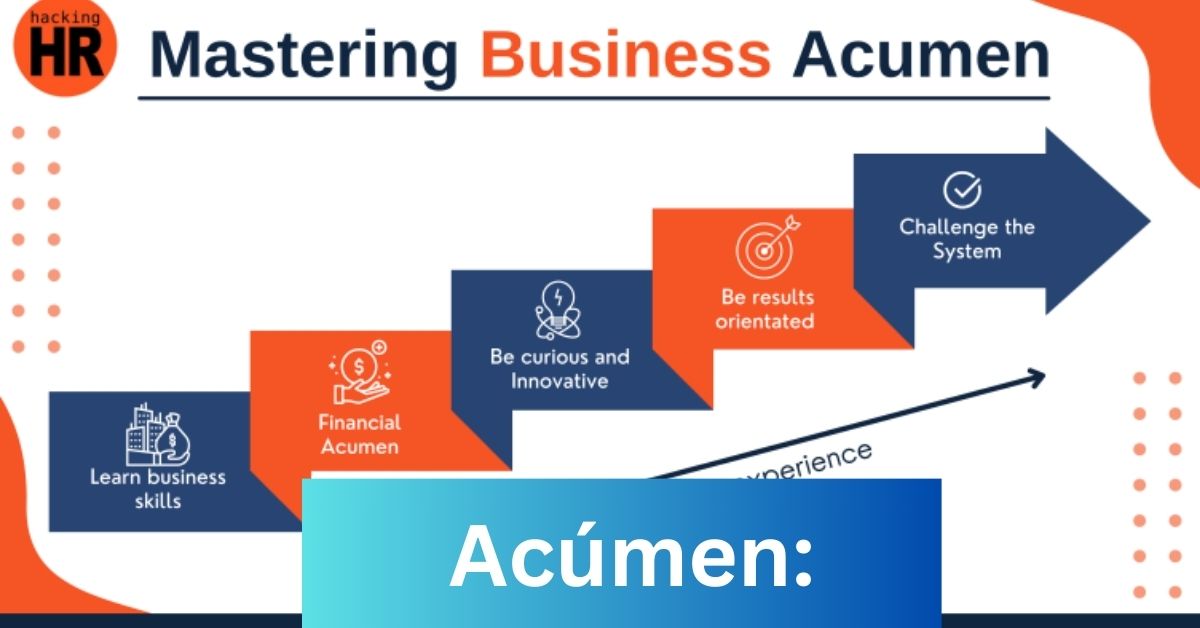AIn a world inundated with information and constant challenges, the concept of “acúmen” stands out as a beacon of intellectual prowess and insight.
Pronounced as [ah-koo-men], acúmen is more than a mere term; it encapsulates a unique form of intelligence that goes beyond the conventional realms.
This article explores the definition, historical significance, and multifaceted importance of acúmen in various contexts.
Table of Contents
Definition of Acúmen:
Acúmen, rooted in Latin, signifies an exceptional level of sharpness, keenness, and insight. It goes beyond mere perception, implying an extraordinary ability to analyze, interpret, and make accurate judgments.

Those with acúmen possess a sharp, discerning intellect, capable of quick-witted and perceptive thinking.
Importance of Acúmen in Various Contexts:
Historical Significance:
The origins and etymology of acúmen trace back to the mid-16th century, originating from the Latin word meaning “sharpness” or “keenness.”
Over time, the concept has evolved, embodying a person’s quick, perceptive ability. From Aristotle’s “practical wisdom” to modern discussions on emotional and interpersonal intelligence, acúmen has been a constant thread in the tapestry of intellectual discourse.
Acúmen in Business:
In the corporate realm, acúmen emerges as a key to success. Business leaders with acúmen can anticipate market trends, make informed decisions, and outmaneuver competitors.
The role of acúmen in decision-making is paramount, providing a strategic edge in navigating the complexities of the business landscape.
Acúmen in Personal Development:
Cultivating acúmen is not confined to the boardroom; it is a pathway to personal success. Practical tips for enhancing individual acúmen include broadening knowledge, keen observation, and regular reflection. Developing acúmen becomes a journey of continuous learning and self-improvement.
Read: Cassasse – A Step-by-Step Guide In 2024
Acúmen in Problem Solving:
Acúmen serves as a powerful tool in problem-solving. It enables individuals to grasp core issues swiftly, assess potential solutions, and make effective choices.
Real-life examples showcase acúmen in action, demonstrating its efficacy in addressing challenges with insight and creativity.
The Psychology of Acúmen:
Understanding the cognitive processes behind acúmen unveils the intricacies of sharp, discerning thinking.
Training the mind for acúmen involves honing critical thinking skills, embracing mindfulness, and engaging in activities that challenge one’s cognitive abilities.
Acúmen vs. Intelligence:
While acúmen and intelligence share cognitive roots, they are distinct. Acúmen emphasizes sharpness, quick-wittedness, and insightful thinking, showcasing that one can possess acúmen without exceptionally high intelligence.

Their complementary roles unfold in various scenarios, each contributing uniquely to intellectual capacities.
Famous Figures with Acúmen:
Profiles of individuals renowned for their acúmen, such as Abraham Lincoln, Maya Angelou, and Warren Buffett, offer lessons from their experiences. These figures exemplify the real-world impact of acúmen on decision-making, problem-solving, and overall success.
Acúmen in Art and Creativity:
Beyond analytical thinking, acúmen fosters creativity and innovation. Artists, designers, and technologists with acúmen connect disparate ideas, identify novel solutions, and envision unique possibilities. The fusion of acúmen and creativity becomes a driving force in artistic endeavors.
Challenges in Developing Acúmen:
While acúmen is advantageous, challenges in its development include the risk of overthinking and excessive analysis leading to anxiety.
Strategies to overcome obstacles involve striking a balance between acúmen and practicality, ensuring a harmonious integration of sharp thinking and pragmatic decision-making.
Acúmen in Education:
Integrating acúmen into educational curricula enhances learning outcomes. Students and educators benefit from acúmen by improving their ability to absorb and retain knowledge, grasp complex concepts, and connect them with real-world applications.
Read: Danny Johnson Bozeman
Impact of Acúmen on Decision Quality:
Analyzing the correlation between acúmen and decision effectiveness reveals a positive relationship. Case studies illustrate how acúmen-driven decisions contribute to positive outcomes, emphasizing the pivotal role of sharp thinking in decision-making processes.
Acúmen in Technology:
The influence of acúmen on technological innovations is evident. Those with acúmen in the tech industry contribute to groundbreaking developments, shaping the future of technology.

The implications of acúmen in technology point towards continued advancements and transformative changes.
Practical Exercises to Develop Acúmen:
Hands-on activities for acúmen enhancement include solving puzzles, critical reading, problem-solving exercises, mindfulness, and meditation.
Incorporating acúmen-building practices into daily life becomes a holistic approach to sharpening one’s intellectual faculties.
Conclusion:
In conclusion, acúmen emerges not just as a word but as a guiding principle for navigating the complexities of the modern world.
From its historical roots to its applications in business, personal development, problem-solving, and beyond, acúmen offers a lens through which individuals can enhance their intellectual capacities.
The fusion of sharp thinking, creativity, and strategic decision-making encapsulates the essence of acúmen, paving the way for success in various facets of life.
As we delve into the multifaceted dimensions of acúmen, we uncover not just a skill but a philosophy that enriches our understanding and approach to the challenges and opportunities that unfold before us.
FAQ’s:
Q1: Can acúmen be developed at any age?
Yes, acúmen can be developed at any age through consistent practice, learning, and exposure to diverse experiences.
Q2: Is acúmen exclusive to business, or does it apply to other areas of life?
Acúmen extends beyond business; it’s a versatile skill applicable to personal development, problem-solving, creativity, and decision-making in various contexts.
Q3: Can someone possess acúmen without being highly intelligent?
Absolutely, acúmen and general intelligence are distinct; one can possess acúmen without exceptionally high intelligence, emphasizing the unique facets of sharp thinking.
Q4: Is acúmen a fixed trait, or can it be improved over time?
Acúmen is not fixed; it can be significantly improved through continuous learning, mindfulness, and practical exercises that challenge cognitive abilities.
Q5: How does acúmen contribute to creativity in art?
Acúmen in art involves connecting disparate ideas, identifying novel solutions, and envisioning unique possibilities, fostering innovation and creativity.
Q6: Can acúmen be a source of stress or overthinking?
While beneficial, excessive analysis and overthinking can pose challenges; striking a balance between acúmen and practicality helps avoid stress and anxiety.
